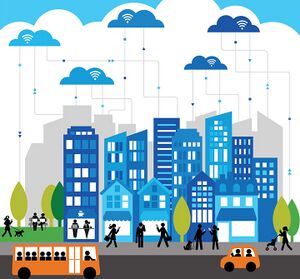ATT
- Members
An American multinational conglomerate holding company registered in Delaware and headquartered at Whitacre Tower in Downtown Dallas, Texas. It is the world's largest telecommunications company and the largest provider of mobile telephone services in the U.S. As of 2020, AT&T was ranked 9th on the Fortune 500 rankings of the largest United States corporations, with revenues of $181 billion
Activities

|
Chula Vista Smart Waterfront | |
| The Chula Vista smart waterfront is a 535 acre joint development by City of Chula Vista and the Port of San Diego – currently the largest waterfront development project on the U.S. West Coast. The development is groundbreaking in its approach to energy efficiency in (1) targeting 50 percent reduction in annual energy use for the development and (2) each building performing at least 15 percent better than Title 24 requirements in the California Building Energy Efficiency Standards. Recognizing the need to monitor and control this new energy infrastructure, the Bayfront project also focuses on the communications network technologies and smart infrastructure solutions that will provide operational efficiency, sustainability, and economic development opportunities for the City. The Project team, led by Black & Veatch, is focused on evaluating the three major components of energy, telecom, and smart infrastructure – determining solutions that will meet the aggressive energy goals and provide a foundational, scalable approach to future communications and smart city applications. | ||

|
Non-Revenue Water Monitoring and Reduction Using Advanced LTE Communications Gwinnet County GA | |
| Install the first LTE communications base instrumentation in a pilot area and develop algorithms for understanding the elements of non-revenue water (lost water) as a means to reduce the cost of water delivery, improve management of scarce water resources, improve system operations, and save money for customers. The pilot will use advanced instrumentation with embedded LTE communications chips, such as smart water meters and pressure sensors to produce data to be used in the development of the software algorithms. | ||

|
Wabash Heartland Innovation Network - Advancing Agriculture and Manufacturing via IoT | |
| The Wabash Heartland Innovation Network (WHIN) is a consortium of 10 counties in north-central Indiana, funded by the Lilly Endowment, devoted to working together to fuel prosperity by harnessing the power of internet-enabled sensors to develop our region into a global epicenter of digital agricultural and next-generation manufacturing. | ||
Details
Living Labs – real insights on Smart City use cases
The Dallas Innovation Alliance (DIA), a 501c(3) public-private partnership, created the DIA Smart Cities Living Lab powered by AT&T. It’s a 4-block corridor in downtown Dallas and houses 9 integrated smart city projects. It also represents the fastest-to-market smart cities initiative in the country.
“This effort is the culmination of the hard work and dedication of our partners across the City of Dallas, civic, academic, corporate partners and the community. We are particularly grateful for the support and leadership of AT&T in making this vision a reality for Dallas.” Jennifer Sanders, DIA Executive Director

Smart City projects can help you realize your city’s vision asset
Citizen satisfaction and safety
Improving the way services are delivered with IoT innovations can help transform cities and enhance citizens lives.
Economic development
Data analytics of smart city technology can be leveraged to help better plan urban economics and projected development.
Sustainability
Taking a strategic approach to integrate technologies can help cities reduce energy, waste and costs, and advance sustainability goals.



